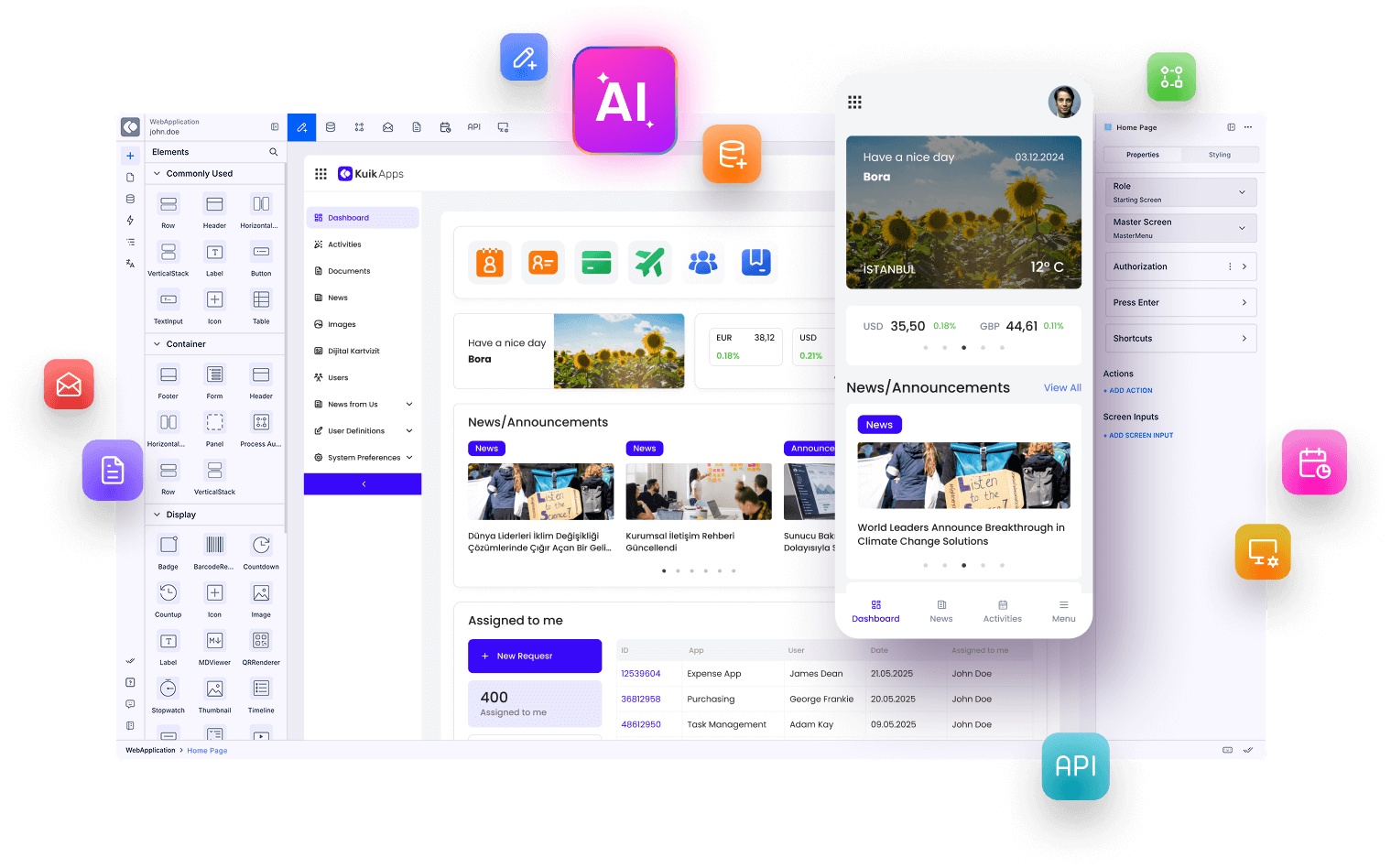As a result of recent technologies that automate and streamline business operations, companies of all sizes are seeking scalable and easy-to-implement software solutions. If you work in the software industry, you know how much time and effort it takes to build an application from scratch.
Tools like low-code and no-code platforms simplify the development process for mobile and web applications. In this article, we explore the benefits of low-code development and present 12 use-cases that could inspire your business development strategy.
What is Low-Code Development?
Low-code development is a software development approach designed to expedite the application creation process by streamlining extensive manual coding tasks. It employs intuitive visual interfaces and drag-and-drop functionalities, making software development faster, easier, and more visually oriented. This approach allows applications to be developed with minimal coding expertise, while still offering the flexibility to incorporate custom code when needed.
Low-code platforms' simple and user-friendly interfaces democratize app development, fostering collaboration across departments. This accessibility particularly benefits citizen developers and individuals with limited knowledge of traditional coding languages.
Using low-code platforms, businesses can build a wide range of applications, including web and mobile apps, user portals, workflow and process automation tools, and more.
12 Use-Cases of Low-Code Development
Minimum Viable Products (MVP)
An MVP is a product with just enough features to validate a core business idea and gather user feedback. Low-code platforms help startups and companies launch applications quickly without heavy upfront investment. This allows businesses to test hypotheses, iterate based on feedback, and pivot if needed — at reduced cost and time.
Omnichannel Data Collection
Omnichannel strategies aim to provide a seamless user experience across multiple channels. Low-code platforms simplify data management through easy integrations like APIs. They allow businesses to create forms, apps, and workflows that work on any device, ensuring consistent data availability and improving customer experiences.
Legacy Modernization & Digital Transformation
Low-code platforms accelerate legacy modernization by enabling businesses to replace or integrate outdated systems with minimal disruption. This boosts agility, efficiency, and competitiveness — essential drivers for digital transformation.
Workflow Automation
Low-code platforms streamline workflows across departments by allowing users to easily build applications that automate repetitive tasks, manage data, and integrate seamlessly with existing systems.
Supply Chain Management
While some manual processes are still needed in supply chain management, low-code applications excel at creating complex, customized workflows. This streamlines operations and boosts overall ecosystem efficiency.
Scalable Applications
Low-code platforms offer the infrastructure and tools to build scalable applications without requiring deep expertise in cloud architectures or distributed systems. As a business grows, applications built with low-code can scale effortlessly to meet rising demands.
IoT Integration
Low-code platforms simplify Internet of Things (IoT) integration by enabling quick development of applications that collect, analyze, and act on IoT device data. This boosts efficiency and unlocks new services across industries like manufacturing and smart homes.
B2C Mobile Apps
Building user-friendly applications for end-users is easier than ever with low-code. Businesses can develop cross-platform mobile apps efficiently, offering essential functionality and enhancing user engagement.
Employee Portals
Low-code platforms empower companies to build employee portals that enhance the employee experience through self-service tools, access to crucial information, and interactive features that improve satisfaction and engagement.
Native Mobile Applications
Mobile apps are a top priority for brands aiming to connect with wider audiences. Popular brands like Nike and Skechers use mobile apps to engage customers. With low-code development, building native mobile apps is more efficient than ever, without sacrificing quality.
Regulatory Compliance
Meeting regulatory requirements around data protection and privacy is critical. Low-code platforms help businesses stay compliant through built-in controls, audit trails, and encryption features, simplifying adherence to strict standards.
Citizen Development
Low-code platforms enable non-developers to create simple apps using drag-and-drop interfaces and pre-built templates. This helps optimize resource management by allowing engineers to focus on complex tasks, ultimately reducing costs and improving organizational agility.
Fast, Easy, Scalable Application Development with Kuika
All these benefits of low-code platforms are just one click away with Kuika’s powerful low-code platform. You can build applications rapidly without compromising quality, performance, or scalability. Whether you’re creating cutting-edge mobile apps or complex web-based solutions, Kuika empowers businesses of all sizes to achieve their development goals easily and efficiently.
Looking to bring your innovative ideas to life? Look no further than Kuika!
Don’t wait — join Kuika now.
















